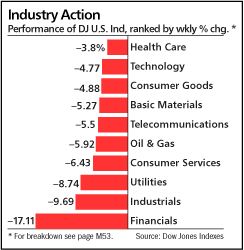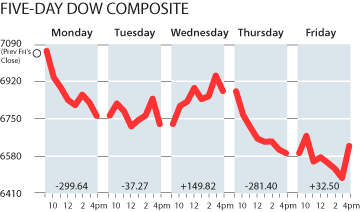From Barrons -
Shares in the nation's largest organic grocer, with more than 275 stores, have plunged by a sickening 80% since, to a new 52-week low of $8.38 a share. We first wrote positively about Whole Foods (ticker: WFMI) in March 2003, and the stock subsequently ran up 210% to $79, before beginning its long descent.
If you're still in the stock, it's probably best just to swallow hard and hold on. Admittedly, the current economic environment works more to the advantage of Wal-Mart-Stores (WMT) and Costco (COST) groceries, but longer-term shifts in consumer appetites should restore Whole Foods to better health.
The company's $700 million cash-and- debt acquisition of rival Wild Oats, with 109 stores, which we applauded at the time ("Oats: A Natural Fit for Whole Foods," March 5, 2007), has given the company indigestion. As John Mackey, founder and CEO of Whole Foods, said of the Oats purchase on a recent earnings conference call: "If I could get my money back, I'd take it back" -- wishful thinking not only for him but for his shareholders.
Beyond the difficulty the company has had in integrating Oats' smaller stores, only 55 of which remain, Whole Foods has had to wage intermittent antitrust fights with the government. The company estimates these skirmishes will cost it six to eight cents a share in fiscal 2009, which began Sept. 29.
Nevertheless, the $1.2 billion-market-cap company has started to include Wild Oats' stores in its comparable-store-sales numbers. For the last four weeks of its fiscal fourth quarter, Oats' comparable-store sales rose 4.6%, versus 0.4% for its total comparable-store tally.
Whole Foods expects sales to grow sales 4.4% this fiscal year to about $8.3 billion, and recently said it was raising $425 million by selling preferred shares to Green Equity Investors. These are convertible into a 17% stake in the company at $14.50 a share, a hefty premium to current levels.
Jackson Robinson, manager of the Winslow Green Growth Fund (WGGFX) and an early bull on the stock, said he sold almost all of his position in Whole Foods when the shares were in the high teens. But Robinson still believes that Whole Foods is "a stock that belongs on one's shopping list."
He cites the growing popularity of natural and organic foods, consumers' rising interest in buying locally grown food -- something Whole Foods has long championed -- and the company's renewed focus on cost containment, decentralized management and value-oriented, private- label products. Besides, the shares now trade at a nearly 30% discount to book value per share.
"If the market were anywhere near normal I believe we'd be beyond the bottom" for Whole Foods, says Robinson. Value shoppers, take note.
Monday, November 24, 2008
Subscribe to:
Post Comments (Atom)


No comments:
Post a Comment